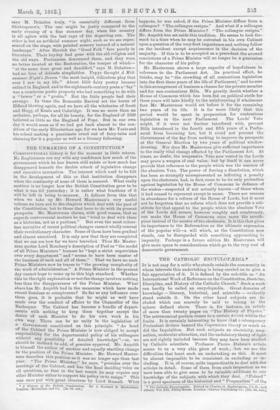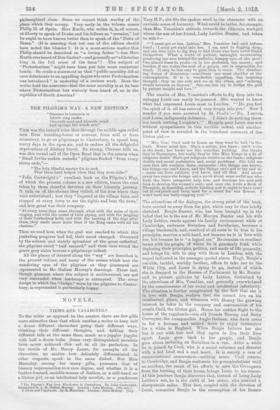THE CATHOLIC ENCYCLOPEDIA.
IT is not easy for a critic who stands outside the community in whose interests this undertaking is being carried on to give a fair appreciation of it. It is defined by the sub-title as "An International Work of Reference on the Constitution, Doctrine, Discipline, and History of the Catholic Church." Such a work can hardly be called an encyclopaidia. Great domains of knowledge — literary, historical, and scientific — evidently stand outside it. On the other hand subjects are in- cluded which can scarcely be said to belong to the sphere defined above. There is, for instance, an article of more than twenty pages on "The History of Physics." The astronomical portion comes to a certain et'ent within the limits. It is certainly interesting to know tint c nitemporary Protestant divines banned the Copernican thecry as much as did the Inquisition. But such subjects as electricity, mag- netism, molecular attraction, and the undulatory theory of light are not rightly included because they may have been studied by Catholic scientists. Professor Pierre D uhern's article seems to us a very able piece of work ; but we see the difficulties that beset such an undertaking as this. It must be almost impossible to be consistent . in excluding or in- cluding. It is, of course, quite impracticable to deal with the articles in detail. Some of them from such inspection as we have been able to give seem to be valuable additions to our knowledge of the subjects with which they deal. "Poland" is a good specimen of the historical and " Pragmatism" of the • The Catholic Eacyclopedia. Edited by Charles G. Horbormitun, LL.D., and. others, Vol. XII. Philip Reuss. London ; Caxton Publishing Co. 1217s, 6d. not.]
philosophical class. Some we cannot think worthy of the place which they occupy. Very early in the volume conies Philip IL of Spain. Herr Kurth, who writes it, is, of course, at liberty to speak of Drake and his fellows as "corsairs," but he ought to have known better than to speak of the "Duke of Essex." (It is amazing that not one of the editors should have noted the blunder I) It is a more serious matter that Philip should be described as "a loving father "—has Herr Kurth overheard of Don Carlos P—and generally as "a Christian king in the full sense of the terra"! The subject of 'Protestantism" might have been put into more competent hands. So crude a statement as that "public morality did at once deteriorate to an appalling degree wherever Protestantism was introduced" is unworthy of a serious work. Does the writer hold the converse—that the same morality is at its best where Protestantism has scarcely been heard of, as in the republics of South America P











































 Previous page
Previous page